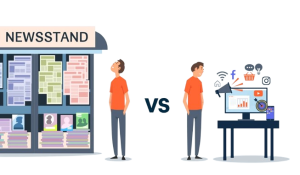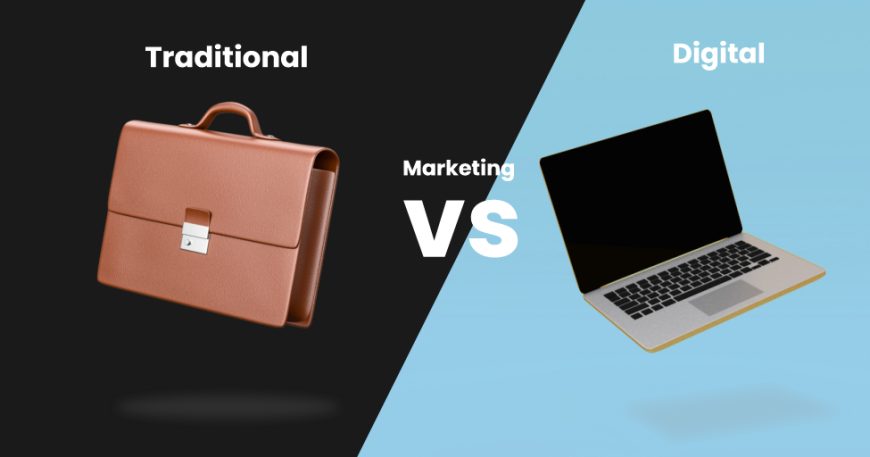Traditional vs. Digital Marketing
Which is Better for Your Business?
Introduction
In today’s competitive market, businesses must decide between traditional marketing and digital marketing strategies to effectively reach their target audience. While traditional marketing methods like TV ads, billboards, and print media have been around for decades, digital marketing has rapidly gained popularity due to its cost-effectiveness and measurable results.
However, which is more advantageous for your company?
In this blog, we’ll explore the key differences between traditional and digital marketing, their advantages and disadvantages, and help you determine the best approach for your business. We will also touch on related concepts such as What is Digital Marketing? A Beginner’s Guide, Understanding the Buyer’s Journey in Digital Marketing, SEO Trends for 2025: What You Need to Know, and Why Content is King: The Power of a Strong Content Strategy.
What is Traditional Marketing?
Traditional marketing refers to offline advertising methods that have been used for years to promote products and services.
This includes:
- Television and radio advertisements
- Newspaper and magazine ads
- Billboards and posters
- Direct mail (brochures, flyers, postcards)
- Telemarketing
Advantages of Traditional Marketing
- Strong Local Reach – Ideal for targeting local audiences through newspapers, radio, and billboards.
- Tangible Impact – Physical marketing materials like brochures and business cards leave a lasting impression.
- Established Credibility – Traditional advertising in well-known publications builds trust with consumers.
- Appeals to an Older Audience – Older generations are more accustomed to traditional media.
Disadvantages of Traditional Marketing
- High Costs – TV and print ads can be expensive, making it less accessible for small businesses.
- Limited Audience Targeting – Unlike digital marketing, traditional methods do not allow for precise audience segmentation.
- Difficult to Measure ROI – Tracking the effectiveness of a billboard or TV ad is challenging.
- One-Way Communication – Customers cannot directly engage with traditional advertisements.
What is Digital Marketing?
Digital marketing involves using online platforms to promote businesses, products, or services.
It includes:
- Search Engine Optimization (SEO)
- Pay-Per-Click (PPC) advertising
- Social Media Marketing (SMM)
- Content Marketing
- Email Marketing
- Influencer Marketing
- Video Marketing
Advantages of Digital Marketing
- Cost-Effective – Digital campaigns can be more affordable than traditional methods, especially for small businesses.
- Precise Targeting – Tools like Google Ads and Facebook Ads allow businesses to target specific demographics.
- Measurable Results – Digital marketing provides analytics to track engagement, conversions, and ROI.
- Interactive and Engaging – Social media and email marketing allow direct interaction with customers.
- Global Reach – Unlike traditional marketing, digital marketing can reach a worldwide audience.
Disadvantages of Digital Marketing
Requires Technical Skills – Managing SEO, PPC, and social media ads requires expertise.
High Competition – Digital space is highly competitive, requiring businesses to optimize strategies constantly.
Algorithm Changes – Search engines and social media platforms frequently update their algorithms, affecting marketing efforts.
Trust Issues – Some consumers are skeptical about online ads due to fraud and scams.
Understanding the Buyer’s Journey in Digital Marketing
To make an informed decision between traditional and digital marketing, understanding the buyer’s journey is crucial.
The buyer’s journey consists of three stages:
- Awareness Stage – The customer realizes they have a problem and begins searching for solutions.
- Consideration Stage – The customer researches different options to solve their problem.
- Decision Stage – The customer selects a product or service and makes a purchase.
Traditional Marketing vs. Digital Marketing in the Buyer’s Journey
Traditional Marketing excels in the awareness stage by reaching broad audiences through TV and billboards.
Digital Marketing is more effective in the consideration and decision stages, as customers actively search for solutions online.
2025 SEO Trends: Essential Information
If you choose digital marketing, staying updated with SEO Trends for 2025 is essential. SEO (Search Engine Optimization) ensures that your website ranks higher on search engines like Google.
Upcoming SEO Trends
- AI and Machine Learning – Search engines will use AI to better understand user intent.
- Voice Search Optimization – More people are using voice assistants like Alexa and Google Assistant.
- User Experience (UX) Matters – Websites with fast load speeds and mobile-friendly designs will rank higher.
- High-Quality Content is Key – Google prioritizes valuable and engaging content over keyword stuffing.
Why Content is King: The Power of a Strong Content Strategy
Whether you choose traditional or digital marketing, content remains the foundation of any successful marketing strategy. The phrase “Content is King” highlights the importance of high-quality content in attracting and retaining customers.
Benefits of a Strong Content Strategy
- Builds Trust and Authority – Well-researched content establishes your brand as an industry leader.
- Improves SEO Rankings – Consistently publishing quality content helps improve search engine rankings.
- Enhances Customer Engagement – Engaging blog posts, videos, and social media content foster interaction.
- Generates Leads – Content marketing drives organic traffic, leading to higher conversions.
Which is Better for Your Business?
Your target market, budget, and business objectives will all influence your decision between traditional and digital marketing.
Choose Traditional Marketing If:
- Your target audience consists mainly of older demographics.
- You run a local business that benefits from physical ads.
- You have a large budget for TV, print, or radio ads.
Choose Digital Marketing If:
- You want a cost-effective strategy with measurable results.
- Your target audience is active online.
- You need precise audience targeting and engagement.
- You want global reach and scalability.
Conclusion
Both traditional and digital marketing have their unique advantages and disadvantages. The best approach is often a mix of both, depending on your business objectives.
However, with the rise of digital consumption, digital marketing is becoming the preferred choice for most businesses due to its affordability, reach, and measurable impact.
If you’re ready to grow your business online, focusing on SEO Trends for 2025, understanding the buyer’s journey, and leveraging a strong content strategy can help you stay ahead of the competition.
Looking for expert assistance in digital marketing? Contact our team today and let’s build a strategy that works for your business!










